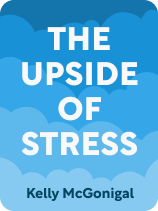

This article is an excerpt from the Shortform book guide to "The Upside of Stress" by Kelly McGonigal. Shortform has the world's best summaries and analyses of books you should be reading.
Like this article? Sign up for a free trial here.
What is Kelly McGonigal’s The Upside of Stress about? What is the key message to take away from the book?
The Upside of Stress by Kelly McGonigal goes beyond fight-or-flight to explore the nuances and overlooked benefits of stress. McGonigal claims that with a balanced understanding of stress and a positive mindset, you can transform your stress from a hindrance into a resource.
Below is a brief overview of The Upside of Stress by Kelly McGonigal.
The Upside of Stress: Why Stress Is Good for You, and How to Get Good at It
We’re often taught that stress is harmful and best avoided, but The Upside of Stress by Kelly McGonigal aims to prove otherwise. Kelly McGonigal argues that stress isn’t the enemy it’s typically made out to be—rather, it’s an ally we should embrace. By changing your mindset on stress, McGonigal claims you can transform it into a resource that leads to enhanced health, greater success, and a more meaningful life.
McGonigal is a health psychologist and professor at Stanford University. She teaches that when it comes to transforming stress, key mindset shifts—like viewing stress as normal and focusing on helping others in order to help yourself—make all the difference.
In this article, we’ll cover:
- What stress is: distinguishing the traditional understanding of stress from McGonigal’s modern definition
- Why you should embrace stress: the costs of avoiding inevitable stress and the meaning found by embracing it
- The importance of your stress mindset: what a mindset is, why your stress mindset matters, and how to change it
- How to develop a better stress mindset: beliefs and practices to transform stress into a benefit for your health, performance, relationships, and happiness
Our guide examines the research that supports McGonigal’s argument, exploring critical nuances of the studies she references and updating her information with current science. We’ll also look at what other stress experts have to say about the complexity of stress and the power of your mindset to influence it. Finally, we’ve incorporated actionable advice to help you put McGonigal’s ideas into practice.
What Is Stress?
First, we’ll discuss McGonigal’s understanding of stress as both potentially harmful and beneficial. To do this, we’ll distinguish the traditional idea of stress from McGonigal’s definition. Then, we’ll discuss the different forms stress can take and how these affect you.
A Traditional—but Limited—View of Stress
McGonigal spent the early part of her teaching career spreading a common, cautionary message about stress: Stress is bad for your health, and you should try to avoid it. Although stress can be harmful, McGonigal now teaches that the research supporting this negative view misrepresents stress’s true, nuanced nature.
McGonigal argues that our fear of stress is largely based on irrelevant research. She claims that most theories describing the negative effects of stress on human health are informed by extremely stressful animal studies (mostly involving rats) whose results aren’t applicable to humans. The stress tests performed on animals were sporadic, uncontrollable, and lacked any meaning for the animals involved. These conditions caused a chronic fight-or-flight response, which led the animals to develop serious health issues like ulcers, depression, and death. Researchers then theorized that because stress is so damaging to the health of animals, it must also be damaging to human health.
Although the stress conditions used in animal studies can apply to extreme cases of human stress–in domestic abuse, for example–McGonigal contends that the chronic fight-or-flight stress response induced by life-threatening conditions in animal studies doesn’t represent the typical, daily stress responses you experience. Therefore, you don’t suffer the same health consequences that the animals in these studies do.
Not only did animal stress research conclude that stress is harmful to your health, but McGonigal explains it also led to the mismatch theory. This is the idea that stress is an outdated, biological mechanism: a response that was helpful to your ancestors—who faced life-threatening danger on a daily basis—but doesn’t apply well to your life in the modern world. The mismatch theory arose because the intense, fight-or-flight response displayed in animal studies was understood to be the default response to any level of stress. In this view, your stress response is the same whether you’re cramming for a test or being charged by a bear. Of course, fighting or running aren’t appropriate responses to a test at school or a work presentation—but we’ve come to view all stress as misplaced and harmful.
A New Understanding of Stress
In contrast to the traditional view, McGonigal explains that your stress response is more sophisticated than just fight-or-flight. Modern research reveals you actually have a variety of stress responses that help you survive life-threatening situations, feel confident to overcome challenges, and connect with others to cope with life’s difficulties. Thus, McGonigal argues that stress isn’t an irrelevant relic of our ancestral past, but a useful resource to be appreciated and utilized.
McGonigal defines stress broadly, as your response when something valuable to you is at risk. This could be your response to an immediate, life-threatening situation, or to meeting your partner’s parents for the first time. Depending on the stress trigger and your perception of it, McGonigal claims your stress response can manifest in one of three ways: the fight-or-flight (threat) response, challenge response, or tend-and-befriend response. Let’s examine each one.
1. Fight-or-Flight (Threat) Response
This response occurs when you perceive your life to be in danger. For example, you’re felling a large tree in your yard and when you step back to watch the trunk tip away from you, you notice it’s starting to lean in your direction. Your body surges with energy and you leap clear of the crashing branches.
When your life’s on the line, fight-or-flight equips you for survival in a variety of ways:
- Your body releases hormones like adrenaline, cortisol, and dopamine to create and distribute more energy, motivate action, and increase your focus on an immediate threat.
- Your body releases excess stores of sugar and fat into the bloodstream for energy.
- You breathe harder and your heart starts racing to deliver oxygen, sugar, and fat more efficiently to your muscles.
- You slow or disable processes like digestion and growth that aren’t necessary for surviving an immediate threat.
- Your blood vessels constrict and inflammation increases in anticipation of injuries that will need repair.
- This stress response makes you more aware of and reactive to similar triggers in the future.
In all these ways, fight-or-flight gives you energy and motivation, and it helps you repair injuries to survive immediate threats at a moment’s notice. However, this response has negative effects, too: As you process your environment in terms of its potential threat to you, you typically experience negative emotions like fear, shame, and anger.
Chronic fight-or-flight responses, in which your body frequently reacts with intensity to perceived threats, can cause long-term health effects like faster aging, suppressed immunity, and greater susceptibility to illnesses like cardiovascular disease.
2. Challenge Response
McGonigal explains that the challenge response to stress kicks in when you feel determined to achieve something or feel called upon to perform, but you don’t perceive your life to be at risk. For example, you’re heading into class to take a final exam, and you notice you’re breathing harder and your heart starts pounding. You feel confident in your preparation and determined to get an A. The challenge response prepares you for success in several ways.
A challenge response energizes you for action without harming your health, McGonigal says. Like the fight-or-flight response, a challenge response ramps up your breathing and heart rate to help you perform. However, because you don’t perceive a threat, your body doesn’t brace for injury by increasing inflammation and constricting your blood vessels—and McGonigal claims that these symptoms cause the harmful health effects associated with chronic fight-or-flight mode. Instead, your blood vessels remain relaxed, inflammation throughout your body does not increase, and you actually gain more energy than you do in a fight-or-flight response because your muscles receive more energy from increased blood flow.
A challenge response also enables you to recover and learn from stress more effectively. This is because, during a challenge response, you produce a higher ratio of the hormones DHEA to cortisol in your blood. DHEA increases the brain’s capacity to learn from stressful experiences. It also enhances immune function and injury repair. Cortisol helps you create and use energy efficiently during stressful situations by turning sugar and fat into fuel and pulling energy away from processes like digestion and growth. A higher ratio of DHEA to cortisol aids your recovery from a stress response by improving your heart and brain health. When the opposite happens and cortisol levels rise (which is typical in a threat response), it can result in immune system dysfunction, depression, and anxiety.
In a challenge response, your body releases other hormones like adrenaline and dopamine to increase energy, motivation, and focus. However, because you don’t perceive a threat, you feel confident rather than afraid. McGonigal claims that increased confidence, along with elevated energy, allows you to perform better during exams, competitions, and at work.
A challenge response even enables you to perform better than if you have no stress response. One study observed the difference between a challenge response and a threat response using the Trier Social Stress Test—a stress-inducing simulation that requires participants to give a spontaneous presentation and take a surprise math test in front of unsupportive judges. Participants with a challenge response had more confidence, performed better, and had a healthier post-test mental state than participants who exhibited threat responses or low-stress responses.
3. Tend-and-Befriend Response
This stress response occurs when you perceive that a person or community you care about needs help. For example, you’re concerned for the mental health of a friend as they process a break-up, so you drive an hour through the night to comfort them in person. Likewise, this response can be triggered by your own need for support. This instinct for connection is driven by the following physical reactions:
Release of Oxytocin
A tend-and-befriend response triggers the release of the social hormone, oxytocin, which makes you more courageous, empathetic, and trusting of others.
One study found that participants who watched their loved ones experience pain from electric zaps felt less afraid and more empathetic if they held their loved one’s hand during the test.
Oxytocin also nullifies the negative health effects caused by extreme, traumatic events or chronic fight-or-flight. One study found that oxytocin released during a stress response protected rats from heart damage during chemically induced heart attacks. The heart attacks only occurred when the rats were given a drug that inhibited oxytocin.
Release of Serotonin
Another dominant hormone in the tend-and-befriend stress response is serotonin, which makes you more aware of your surroundings. In this way, you’re better able to notice critical details and act more effectively. For example, you’re stressed because the baby you’re caring for is crying. Because your tend-and-befriend response is triggered and your awareness is heightened by serotonin, you notice the baby is wriggling uncomfortably in your arms and her belly is bloated. These symptoms tell you she’s likely crying because she has to burp.
Why You Should Embrace Stress
Not only can stress empower you in a variety of ways, but it’s also natural and inevitable. Therefore, McGonigal argues that avoiding stress is futile and harmful. She claims that to resist stress is to resist living a full life. So, it’s important to embrace the benefits of stress in order to live meaningfully. In this section, we’ll first explain how avoiding stress causes more harmful stress and unhappiness. Then, we’ll talk about why McGonigal claims a stressful life leads to happiness and meaning.
Avoiding Stress Is Futile and Harmful
By trying to avoid stress, McGonigal explains that you ironically create more stress. This is because avoiding things that stress you out reinforces your stress about those things. Additionally, avoiding what causes you stress can cause new stresses. For example, you might feel stressed about not being a good enough partner, so you avoid romantic relationships. Because you avoid dating anyone, you isolate yourself and reinforce your fear that you’re not good at relationships. Additionally, you may deprive yourself of the support that a loving partner would offer, or you might feel stressed about the meaningful experiences you’re missing out on by not having a partner.
Research shows the physical consequences of trying to avoid stress can include depression, impulsiveness, and a greater likelihood of negative life events such as losing your job or getting a divorce.
Avoiding stress can also lead to substance abuse. In order to suppress unpleasant feelings associated with stress, you might excessively use drugs and alcohol. For example, rather than viewing your responsibilities as challenges that produce meaning in your life, you feel overwhelmed and try to suppress this feeling by drinking alcohol. Heavy drinking leads to health issues like liver damage and negatively affects personal relationships—which also leads to more stress.
Pursuing a Meaningful Life Is Stressful
McGonigal explains that stress is paradoxically associated with happiness and meaning. For example, countries where people report more stress also have a higher GDP, more happiness, and greater satisfaction with life.
Why do we find meaning in the same places we find stress? McGonigal claims that if you pursue ambitious goals and take on significant responsibility, you’re more likely to be stressed—but you’re also more likely to be happy, find meaning in your life, and live longer. For example, you might say that your kids are your greatest source of daily stress. You want them to be safe, successful, and happy, but all of these things are uncertain and cause you to worry. However, your kids might also be your greatest source of happiness. Their silliness and love brighten your day, and caring for them gives you a sense of purpose.
McGonigal adds a caveat to this argument, explaining that some studies show stress is also associated with depression and mortality. For example, a study measuring the effect of stress on men’s mortality over 50 years found that men who reported the most daily hassles were far more likely to die. However, the measurement that tracked daily hassles was highly subjective: Participants were presented with a list of everyday responsibilities and were asked to rate whether they considered these things a hassle or uplifting. Those who rated daily activities as a hassle were more likely to die. McGonigal argues that because the list of everyday activities consisted of things that are inherent in daily life, this method of measurement actually demonstrated that the participants’ mindsets—that is, their perceptions or beliefs about their daily activities—determined whether daily hassles were deadly or not.
Your Mindset Makes All the Difference
To unlock the benefits of stress, McGonigal encourages you to change your perception of it. She explains that you can achieve this through a mindset shift that primes you to react to stress with a challenge or tend-and-befriend response rather than chronic fight-or-flight responses. In this section, we’ll explain what a mindset is, why it’s important for transforming stress, and how to change it.
What Is a Mindset?
According to McGonigal, a mindset is a set of beliefs that influences your perception of reality. McGonigal explains that you probably have a lot of beliefs, but not all of your beliefs are mindsets. For example, you might believe honey goes better with peanut butter than jelly does, but this belief doesn’t affect your outlook on life or influence your daily decisions (except during lunch, maybe).
In contrast, a mindset is a pervasive philosophy that determines your thoughts, goals, and actions. For example, if you believe college is a transactional experience, in which you go through the motions to earn your degree, you’ll probably do whatever’s necessary to make passable grades. However, if you believe college is an opportunity to explore your interests, become a better thinker, and grow as a person, you’ll likely engage more with the school’s resources and have a more meaningful learning experience.
Why Is Your Stress Mindset Important?
Because your mindset influences your thoughts, goals, and actions related to stress, it determines the consequences of stress on your life: whether stress is confidence boosting, performance enhancing, and health improving, or whether it causes self-doubt, debilitation, and a shorter life. In other words, your mindset influences whether you respond to stress with challenge and tend-and-befriend responses or potentially harmful threat responses.
(Shortform note: The idea that your mindset determines the effects of stress echoes Stoic philosophy, which says that your perception of events determines whether they’re harmful or not. While McGonigal supports the power of your mindset by referencing scientific research, Stoic philosophy argues that your mind influences the outcomes of your life because humans are reasonable beings. Because you have reason, you have control over your mind. Thus, as long as your mind is functioning properly, you have the power to decide what’s harmful or not.)
McGonigal cites a 1998 study showing that high levels of stress increased the risk of death by 43%—except for those who didn’t believe stress was harmful. In fact, the lowest risk of death occurred in those who experienced high stress but didn’t believe it was harmful. This risk was even lower than those who reported low levels of stress. Although the researchers didn’t manipulate the participants’ mindsets—and thus, couldn’t say for certain that a difference in mindset was the cause—participants’ negative mindset was the strongest predictor for mortality.
How to Change Your Stress Mindset
If you’re starting to feel stressed about your negative outlook on stress, don’t fret; mindsets can be changed. A shift in mindset can be triggered by something as simple as brief exposure to a new way of thinking.
Further, McGonigal explains that even if a new idea doesn’t remain conscious in your mind, it can still subconsciously influence your thoughts and actions in the future. In one study, high school freshmen in a poorly performing school were given a 30-minute presentation about adopting a growth mindset—that is, the belief that traits like intelligence aren’t predetermined and can improve with effort. These freshmen passed algebra at a rate of 81% compared to 58% of the control students. The students receiving the presentation on mindset were also healthier and improved their GPA from 1.6 to 2.6.
Transform Your Stress Mindset
Now that you understand why mindsets are important, we’ll discuss how to transform your mindset on stress. First, we’ll discuss why it’s important to focus on your resources. Then, we’ll talk about connecting with others and keeping your highest values in mind. Finally, we’ll explain why you should always try to look for a genuine silver lining in your stress.
Focus On Your Resources
In order to prompt a challenge response when you’re facing a stressful situation, McGonigal suggests taking account of your resources. Research shows that the most important determinant of your response to stress is your mindset about your ability to handle a given situation. If you don’t feel like you have the resources necessary to handle a given situation, you’ll induce a threat response. On the other hand, if you feel like you’re capable of taking on a situation, you’ll be more likely to induce a challenge response. In order to trigger the latter response when you’re faced with a difficult situation, McGonigal says to keep the following resources in mind:
- Acknowledge strengths that can help you.
- Think of moments in your past when you’ve handled similar situations well.
- Think of loved ones or friends who can offer support.
- Pray or imagine other people praying for you.
- Think of your stress response itself as a resource.
Connect With Others
Next, it’s important to engage with others in response to stress. McGonigal claims a threat response is more likely when you feel isolated in a stressful situation. To prime yourself for tend-and-befriend responses, consider the following strategies:
Choose to Help Others
This can be something small, like listening to a problem or being present for somebody during a difficult time. Studies show that generosity satisfies our reward centers and helps us cope with our own stress better. In one study, participants felt less time-constrained at work when they used some of their time to help others.
(Shortform note: Although helping others can help you cope with stress, there may be a limit to how much help you should give, whether at work or in your off time. One study found that people who helped others with favors like running errands or watching another person’s children for more than 80 hours per year were slightly less resilient to stress than those who helped a moderate amount. So, don’t feel bad if you’re not able to help others out all the time. A little bit of help every now and then is still good for those you’re helping and it can benefit your health.)
Focus on a Common Good
When you focus on a goal that aligns with the common good of your family or community, you feel a part of something bigger than yourself. McGonigal claims that you’ll be just as motivated as if you were striving for your own gain, but your motivation will be less draining because it’s not selfish and isolating. Rather, contributing to a greater mission or community helps you build supportive relationships with people and leads to a greater sense of meaning and happiness.
(Shortform note: Like McGonigal, the author of Meditations claims that acting for the common good connects you to something bigger than yourself—that is, all of humanity. According to the ancient Roman emperor Marcus Aurelius, serving others is essential to a good life because by serving others, you act according to reason. Reason is a natural, common law shared by all humans. This common law of reason unites us as common citizens. Because citizens of the same community should support each other, humans—united by our reason—should support each other.)
Normalize Stress
To further connect with others, McGonigal recommends normalizing stress by increasing your awareness of other people’s struggles. Practice this by constantly recognizing that the people you’re interacting with have their own struggles. Next, realize there are many people in the world who feel just like you do. Embrace this invisible community.
Be More Open About Your Own Stress
If you struggle with something that you wish people were more open about, initiate this change by personally discussing it more. For example, if you struggle with anxiety, admit when you’re feeling anxious to people you trust, or start a social media group that discusses anxiety. Not only will you help others by opening up about your struggles, but offering support will lead to reciprocation.
Remember Your Values
Another way stress becomes harmful is when you fail to find meaning in it. McGonigal suggests keeping your highest values present in your thoughts to help put your stress into context and transform it into something meaningful.
To do this, McGonigal recommends putting a reminder of your values on a bracelet or keychain, or writing about it. For example, if your highest value is your family, consider making a bracelet that lists your family’s names or putting a picture of them on the lock screen of your phone.
(Shortform note: Psychologists suggest that orienting yourself with your values or your “reason why” can help you endure discomfort. To find an effective “why,” don’t base it on expectations, public approval, or guilt. Instead, choose something that feels truly meaningful to you.)
Embrace Stress as an Opportunity to Grow
McGonigal claims you can also make stress meaningful by realizing it can help you grow. She describes three ways to do this:
1. Believe good things can come from adversity. If you go through a difficult breakup, realize that the pain of this situation can also provide you with more freedom and an opportunity for personal development.
2. Embrace and fully process stress to transform it into something that empowers you. For example, if you’re a teacher stressed about the difficulty of a lesson you’re teaching or the pile of papers left to grade on your desk, you might feel tempted to emotionally distance yourself from your students. But by limiting your availability to them, you may reduce the sense of meaning that students give your work. Instead, you could use your stress to form a deeper connection with students by being honest about your struggles and relating to their own sources of stress. In this way, you might cultivate a more comfortable, trusting environment for your students to learn in.
(Shortform note: McGonigal isn’t the only psychologist who claims stress can be turned into strength. For example, one psychologist claims that with proper guidance, anxiety can lead to more conscientious behaviors. There are multiple ways to properly channel anxiety into healthy conscientiousness, such as prioritizing the most doable and impactful tasks and tempering your anxious concerns with data.)
3. Recognize and celebrate signs of growth from difficult experiences. For example, If you’re finally able to drive without fear after a traumatizing car accident, share this progress with a friend who you know will appreciate your growth and encourage you.
Be Honest About Your Stress
When you try to find benefits in your stress, McGonigal recommends aiming to develop a mindset that views stress in a realistic, balanced way, not with blind optimism. She suggests a couple of ways to help develop this outlook.
1. Recognize the positives and negatives of stress, but choose to focus on the positives. For example, you had to euthanize your old and sick dog. Rather than ignoring that this makes you sad and you miss them (their cuddles, going on walks together, or simply their presence in your home), acknowledge your feelings and focus on the positive side of the situation: Your dog is no longer suffering and you have wonderful memories to reflect on.
2. Don’t try to force a silver lining on a negative situation in a way that’s insincere or delusional. There might not be an upside to extreme traumas or even trivial, daily activities, and that’s OK. If there’s no obvious upside at the moment, McGonigal suggests trying to think about how you might benefit from the situation in the future. For example, when a loved one dies, think of the qualities that made them a positive influence on your life. Imagine ways you could embody these qualities one day to have a more positive impact on the people in your life and honor your loved one’s legacy.

———End of Preview———
Like what you just read? Read the rest of the world's best book summary and analysis of Kelly McGonigal's "The Upside of Stress" at Shortform.
Here's what you'll find in our full The Upside of Stress summary:
- Why stress is an ally that should be embraced
- How stress can lead to enhanced health, greater success, and a more meaningful life
- How to change your mindset about stress to receive its benefits





